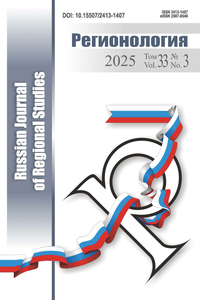E. A. Koval, V. A. Pronkina. Formation of a Social Imaginary «Good Society» in the Blogosphere of the Region
UDC 316:130.2(470.345)
E. A. Koval, V. A. Pronkina. Formation of a Social Imaginary «Good Society» in the Blogosphere of the Region
The paper was prepared within the research project “Normative foundations of “the good society” (grant MK-5295.2016.6 from the President of the Russian Federation).
KOVAL Ekaterina Aleksandrovna, Candidate of Philosophical Sciences, Associate Professor at the Department of Law Enforcement Activities and Enforcement Proceedings, Middle Volga Institute (Branch) of Russian State University of Justice in the City of Saransk (Saransk, Russian Federation) (e-mail: nwifesc@yandex.ru). ORCID: http://orcid.org/0000-0003-0069-5335. ResearcherID: A-5797-2015
PRONKINA Victoria Aleksandrovna, 2nd Year Student Pursuing a Master’s Degree in Sociology, National Research Ogarev Mordovia State University (Saransk, Russian Federation) (e-mail: viktoryakeny@gmail.com). ORCID: http://orcid.org/0000-0003-0475-1234
Key words: region, social imaginary, “good society”, blogosphere, hate speech
Abstract. The paper discusses the formation of the image of a regional society in the blogosphere. This image is an important component of the image of a region, but unlike the image, it is based not on the control theory but on the social imaginary — the ideas of people about the society they live in, as well as about the prospects and directions of development of this society. ‘The good society’ is a constructive variant of the social imaginary.
Synopsis. Introduction: the social nature of the human being contributes to formation of the views on the value-normative social space and development of the society. Study of the social imaginary is necessary for taking administrative decisions, determining the tactics and strategy of social development and maintaining the optimal social practices. Analysis of the blogosphere seems to be a promising way of studying the social imaginary. The paper examines the image of a particular region, the Republic of Mordovia, formed in a separate segment of the blogosphere.
Materials and Methods: the authors applied the method of content analysis; blog posts mentioning the Republic of Mordovia or the city of Saransk and comments to them were chosen as the object of the analysis. Posts from the “LiveJournal” from 14 June to 31 December 2016 were analyzed.
Results: the blogosphere has negative, positive and axiologically neutral images of the regional society. Formation of negative images is significantly affected by the hate speech the bloggers used to describe the value-normative space in which the regional society exists (the case study of the Republic of Mordovia).
Discussion and Conclusions: the optimal variant of the social imaginary is ‘the good society’, the paradoxically reachable social ideal. Transmission of the idea of ‘the good society» at the regional level in the blogosphere may serve to unite the members of the regional society with a view to its improvement, institutionalization and maintenance of the value-normative structure of the society optimal for its development. However, the use of the hate speech when describing and discussing the problems of the region hinders the formation of such a type of the social imaginary as ‘the good society’.
REFERENCES
1. Thompson J.B. Studies in the Theory of Ideology. Los Angeles: University of California Press Berkeley; 1984. 374 p.
2. Castoriadis C. The Imaginary Institution of Society. Massachusetts: The MIT Press Cambridge; 1975. 267 p.
3. Taylor Ch. A Secular Age. Cambridge: The Belknap Press of Harvard University Press; 2007. 376 p.
4. Galbraith J.K. The Good Society: The Humane Agenda. Boston, New York; 1997. 160 p.
5. Lippmann W. The Good Society. New York: Grosset and Dunlop; 1956. 38 p.
6. Etzioni A. The Good Society. Seattle Journal of Social Justice. 2002. Vol. 1. Iss. 1. P. 83—96.
7. Etzioni A. Die Entdeckung des Gemeinwesens. Anspriiche, Verantwortlich-keiten und das Programm des Kommunitarismus. Stuttgart; 1995. 375 p.
8. Etzioni A. Die Verantwortungsgesellschaft. Individualismus und Moral in der heutigen Demokratie. Frankfurt am Main: Campus-Verlag; 1997. 375 p.
9. Etzioni A. Wie eine gute globale Gesellschaft entsteht. Internationale Politik und Gesellschaft. 2004. № 2. P. 12—30.
10. Fedotova V.G. Horoshee obshhestvo [Good society]. Moscow: Progress-Traditsiya Publ.; 2005. 544 p.
11. Social’nye znanija i social’nye izmenenija [Social knowledge and social change]. Moscow: IF RAN; 2001. 284 p.
12. «Horoshee obshhestvo». Social’noe konstruirovanie priemlemogo dlja zhizni obshhestva [“Good society”. Social design of a society acceptable for life]. Moscow: IF RAN; 2003. 182 p.
13. Augustine Aurelius. O grade Bozhiem [The City of God]. Minsk: Harvest Publ.; 2000. 1294 p.
14. Locke J. Two Treatises of Government. Cambridge: Cambridge University Press; 2003. 464 p.
15. Rawls J. Teorija spravedlivosti [A theory of justice]. Novosibirsk; 1995. 341 p.
16. Nozick R. Anarchy, State, and Utopia. New York: Basic Books; 1974. 368 p.
17. Sen A. The Idea of Justice. Harvard University Press; 2009. 496 p.
18. Pisachkin V.A., Kozin V.V. Region kak smyslovaja konstrukcija v sociologii. Prakticheskij smysl regional’nyh issledovanij [Region as Notional Construction in Sociology. Practical Meaning of Regional Researches]. Regionologiya = Regionology. 2011; 4:4—12. Available from: http://elibrary.ru/item.asp?id=17721798 (accessed 31.08.2016). (In Russ.)
19. Pronkina V.A. Problema opredelenija ponjatija «jazyk vrazhdy» [The problem of defining the concept of “hate speech”]. Rossija v prostranstve global’nyh transformacij: v fokuse nauk o cheloveke, obshhestve, prirode i tehnike: XIX Vavilovskie chtenija = Russia in the space of global transformations: the focus of the human, social, natural and technology sciences: the 19th Vavilov Readings. Yoshkar-Ola: PGTU, 2016. P. 51—54. Available from: http://elibrary.ru/item.asp?id=26129704 (accessed 31.08.2016). (In Russ.)
Contribution of the authors:
KOVAL Ekaterina Aleksandrovna — academic advising, theoretical analysis of the issue, interpretation of the results of the content analysis.
PRONKINA Victoria Aleksandrovna — selection of the research methodology, implementation of the content analysis.
For citation: Koval E.A., Pronkina V.A. Formation of a Social Imaginary «Good Society» in the Blogosphere of the Region. REGIONOLOGIYA = REGIONOLOGY. 2017; 1(98):92—104.

All the materials of the "REGIONOLOGY" journal are available under Creative Commons «Attribution» 4.0
















